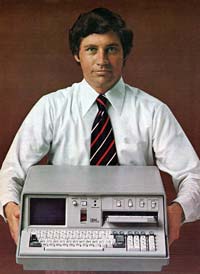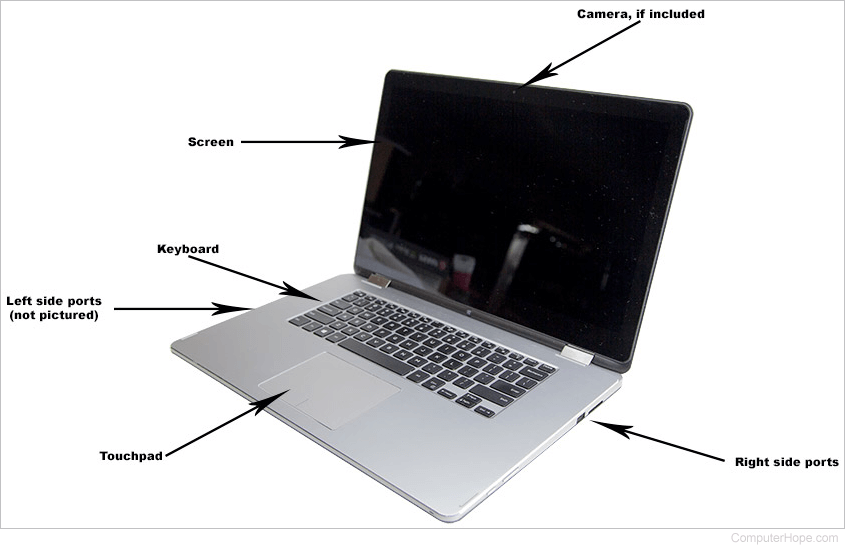Laptop

Alternatively called a notebook, a laptop is a portable computer that is more efficient and nearly as powerful as a desktop computer. Portable computers run off AC power or batteries such as NiMH (nickel-metal hydride), NiCad, or Li-ion packs, for several hours.
As shown in the picture, the Dell Latitude D610 notebook has everything needed for normal operation. It has an LCD (liquid-crystal display) screen, keyboard, and touchpad. Although a laptop may have multiple external devices and cables connected, no external connections are required for standard usage.
A laptop is not spelled as "labtop," "lab top," or "lap top."
Today, most laptop computers are becoming thinner and lighter to help compete with other devices, such as tablets. Some laptops, especially those with smaller form factors, may also be called notebook computers.
Intel also sells a line of ultra-thin laptops under the name Ultrabook.
What was the first laptop or portable computer?

The IBM 5100 is the first portable computer, which was released in September 1975. The computer weighed 55-pounds and had a five-inch CRT (cathode ray tube) display, tape drive, 1.9 MHz PALM processor, and 64 KB of RAM (random-access memory). The picture is an ad of the IBM 5100 taken from a November 1975 issue of Scientific American.
The first truly portable computer or laptop is the Osborne I, which was released in April 1981 and developed by Adam Osborne. The Osborne I weighed 24.5-pounds, had a 5-inch display, 64 KB of memory, two 5 1/4" floppy drives, ran the CP/M 2.2 operating system, included a modem, and cost $1,795.
The IBM PCD (PC Division) later released the IBM portable in 1984, its first portable computer that weighed 30-pounds. Later in 1986, IBM PCD announced its first laptop computer, the PC Convertible, weighing 12-pounds. Finally, in 1994, IBM introduced the IBM ThinkPad 775CD, the first notebook with an integrated CD-ROM (compact disc read-only memory).
In the December 8, 1985 New York Times, an article was published by Erik Sandberg-Diment, who stated the average user would never want a laptop.
The first Apple laptop, the Macintosh Portable, was released in September 1989. Due to its size and cost (roughly $6500), it was not popular. Apple changed its approach to laptop development and, in October 1991, released the PowerBook line of laptops. They released the PowerBook 100, PowerBook 140, and PowerBook 170, which were better received in the computer market.
What are the different parts of a laptop?
There are several parts of a laptop, as shown below.

Below are links to pages with further details about each of the parts shown in the picture.
Other laptop parts
The following list includes other components of a laptop and are not shown in the picture above.
- AC adapter
- Battery
- Logic board
- Storage device (e.g., HDD (hard disk drive), SSD (solid-state drive), M.2)
- Fan
- Speakers
- Microphone
- Memory
- Optical drive
- Wireless card
What are the different ports on the laptop?
Each of the ports on a modern laptop is shown below.
Each laptop is different, and the available ports vary between manufacturers. Your laptop may not include the same ports as shown below or might have different ports than shown.
The left side of a laptop
Our example laptop below has the following available ports. Clicking any of the following links provides further information about that port.
- Kensington lock, or security cable slot
- AC adapter port, or power adapter port
- HDMI (High-Definition Multimedia Interface) port
- USB (universal serial bus) 3.0 ports
- Headset port

The right side of a laptop
On the right side of our example laptop, the following ports and buttons are available. Clicking any of the following links provides further information about that port.
- Power button
- Volume control
- USB 2.0 port
- SD card reader

Other laptop ports
Below is a full list of ports on laptops over the years. The ports available on a laptop depend on its age and manufacturer.
If you need a port not available on your laptop, use a converter that changes one signal to another. For example, if you need a VGA (video graphics array) connection, use an HDMI to VGA converter. There are also docking stations and hubs that add ports.
- Card reader
- Docking station
- DVI (digital visual interface)
- FireWire (IEEE-1394)
- HDMI
- Modem (RJ-11 aka telephone)
- Network (RJ-45)
- Parallel port
- PS/2 port
- S-Video
- Serial port (RS-232)
- Sound card (sound out or line out, sound in or line in, microphone)
- USB
- VGA/SVGA
Is a Chromebook a laptop?
Yes, a Chromebook is a laptop. That said, the term Chromebook should be used because they only run ChromeOS rather than the Microsoft Windows or macOS operating systems seen on other laptops. See our Chromebook page for further help with Chromebooks.
Battery, Booklet, Computer, Cooler pad, Dynabook, ExpressCard, Fn, Hardware terms, Laptop bag, Laptop stand, Luggable computer, Netbook, OLPC, Operating system, PC Card, Portable, Portable computer
